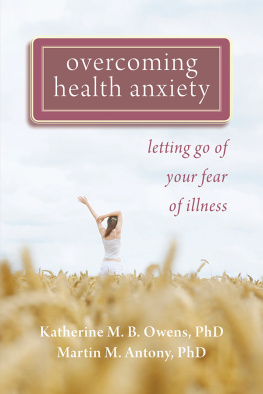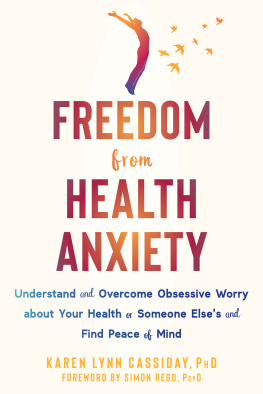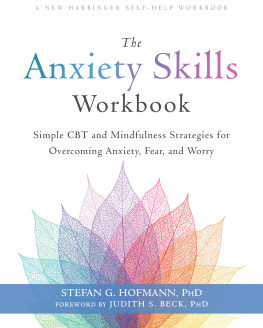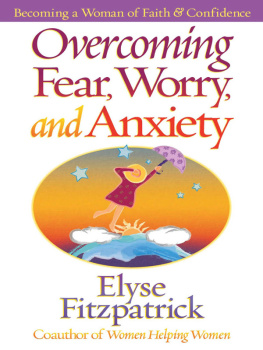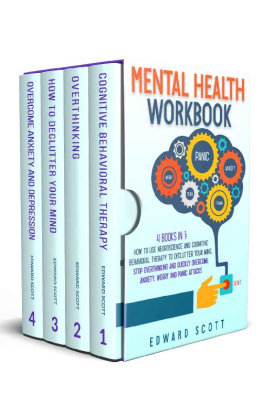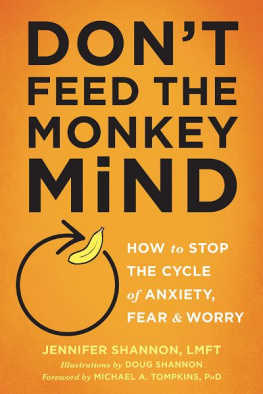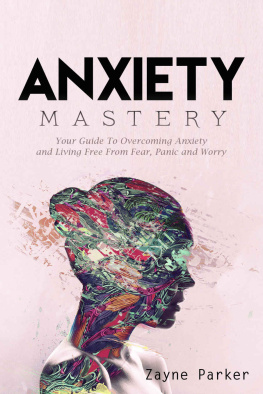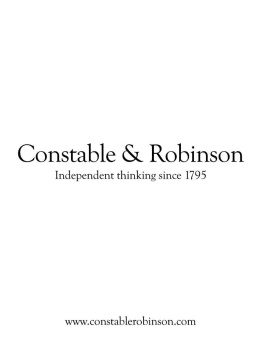The authors wish to thank the many people who helped this project come together by reading chapters and making useful comments and suggestions. Special thanks to Shahlo Mustafaeva, whose careful proofreading and compiling of references made the task of writing that much easier. Also, we are grateful to the staff at New Harbinger Publications for their support, encouragement, and help from the inception of this work to its completion. Finally, we would like to thank all of our clients, whose rich lives helped us formulate case examples we hope the reader can relate to.
chapter 1. Understanding Health Anxiety
If you have health anxiety, you probably worry about your health, focus on bodily symptoms that frighten you, check repeatedly for signs and symptoms related to your health concerns, focus on death or dying, or frequently try to obtain reassurance from family, friends, or doctors. That said, health anxiety means something different for each person. In fact, all readers of this book will understand and experience health anxiety in their own ways. In this chapter you will learn more about the symptoms, causes of, and treatment for health anxiety.
What Is Health Anxiety?
Many of us are irritated with small doubts or questions about our health from time to time. Almost everyone has wondered at some time whether a cough that just wont go away might be something serious, or whether the fellow who sneezed at the next table is contagious. Many people may avoid touching questionable surfaces if they are at a walk-in clinic or hospital, and may wash their hands extra well just in case. The majority of us are also guilty of occasional online searching to see what our symptoms might mean.
A little anxiety about your physical or mental health can be a very good thing; without it you might never go for a checkup, get a cavity filled, go on vacation, or watch your diet. Not all health anxiety is unrealistic or exaggerated. A twisted ankle that might be broken should be x-rayed, and a sore tooth and swollen face should be checked out by a dentist. Your physician will confirm, for example, that yearly checkups are not unreasonable. On the other hand, excessive health anxiety comes with persistent, unrealistic, maladaptive worries and all the problems that accompany them. In this book we focus mostly on this type of disruptive anxiety. People with moderate or high levels of health anxiety may experience some, or all, of the following:
- Fleeting worries about numerous feelings and sensations (for example, headache, stomach upset, itching, dizziness). These may change from day to day depending on what seems most immediate or important.
- Significant and lasting distress about a few specific feelings and sensations (for example, if your father suffered a serious heart attack at your age, cardiac symptoms might be the only ones that worry you).
- Extreme worry about the possibility of contracting a specific disease (such as cancer, HIV, or multiple sclerosis). This concern might persist or creep back after you have undergone tests and been reasonably reassured by your doctor.
- Fear of public places or situations where you might be exposed to disease or germs (for example, a full airplane, a hospital, or a funeral) because of the anxiety that they could make you seriously ill.
- Anxiety sometimes so strong that you may begin to act in ways that, logically, you know dont make sense. Examples might include avoiding television shows about illness or avoiding reading the obituaries. While on the one hand, it seems obvious that you cant become sick from reading an obituary, on the other hand, doing so can provoke anxiety and discomfort.
Exercise: Identifying the Effects of Health Anxiety
Are there other ways that your health anxiety affects you? If so, record them in your journal, along with any items from the preceding list that apply to you.
* * *
Are You A Hypochondriac?
When discussing health anxiety, researchers and clinicians often refer to hypochondriasis (a hypochondriac is someone who suffers from hypochondriasis). Although hypochondriasis and health anxiety are related, they are not the same thing. Health anxiety is much broader, and can be a feature of depression, various anxiety disorders, chronic illness, pain, and many other problems. Hypochondriasis, on the other hand, is a psychiatric term referring to one particular psychological disorder with very specific diagnostic criteria (American Psychiatric Association 2000). A diagnosis of hypochondriasis requires the following features to be present:
- The person must be preoccupied with a fear of having a serious disease based on misinterpreting the meaning of the physical symptoms.
- The fear has to continue despite medical tests showing that nothing is wrong and despite reassurance from doctors.
- The person is aware on some level that this fear may not be 100 percent accurate.
- The fear cannot be focused exclusively on a concern about the persons physical appearance.
- The health-anxiety problems have to be present for at least six months.
Note that several psychiatric conditions involve the intentional production of either physical or psychological symptoms. The motivation for this behavior may be to receive attention and care, avoid responsibilities, or get external rewards, such as an insurance settlement or disability pay. We mention this here because this is what people sometimes mistakenly believe hypochondriasis means. Hypochondriasis does not involve the intentional production of symptoms, and people with hypochondriasis are not faking their symptoms. Rather, the symptoms are very real, but they misinterpret the symptoms as a sign of serious disease.
Some labels, especially certain psychiatric labels, can be very value laden. This is the case with the terms hypochondriasis and hypochondriac. Over time, the slang use of these terms has become very negative, not to mention inaccurate. In fact, calling someone a hypochondriac may imply that the person is faking the symptoms or is somehow weak. Some might assume that the persons suffering is not justified, or that what the person is experiencing can be overcome simply by trying harder or ignoring the fears. Such assumptions are inaccurate and unfair.
Understanding Anxiety
Anxiety is a common human experience. Whether you are experiencing apprehension about your health, about the big meeting on Monday, or about getting the house in shape before your in-laws arrive in twenty minutes, the experience of anxiety has a surprising sameness. To work on health anxiety, you will need an understanding of anxiety in general.

